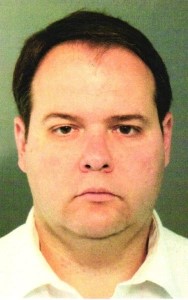A clinical psychologist and recognized expert in child sexual abuse testified Tuesday in the Solano County Superior Court trial of James Glenn Haskell that “a very small minority” of victimized children lie about being sexually abused or assaulted.
The statement by Blake D. Carmichael followed direct questioning by Deputy District Attorney Shelly Moore and later cross-examination by defense attorney Thomas Maas, the latter questioning the psychologist about a 1983 article by Roland C. Summit, whose findings described Child Sexual Abuse Accommodation Syndrome, or CSAAS.
Referring to Summit’s findings, Carmichael, an associate clinical pro
James Glenn Haskell. (Solano County Sheriff’s Office)
fessor with UC Davis Health, said sexually abused children try to resolve the experience in five ways: Secrecy, helplessness, entrapment and accommodation, delayed and conflicted, or unconvincing, disclosure, and recanting or retraction.
On the witness stand during the morning session in Department 25, Carmichael also told Maas that disbelieving kids who have been sexually abused can be quite harmful.
And “a lot of times adults don’t believe a child because of the delay” in reporting the abuse or assaults, he said.
Maas questioned Carmichael, the author of several published articles about child sexual abuse, if his writings were “peer-reviewed,” or evaluated by one or more people with similar expertise in the subject matter.
They were, said Carmichael.
Maas continued to press the psychologist, who works at the UC Davis Hospital’s Children Care Center, about Summit’s article, asking if the findings were “scientific.”
The 1983 article would not be described as scientific, said Carmichael, adding that Summit’s conclusions were based on extensive “observations” while working with traumatized victims. The article’s intent, he noted, was educational and meant to dispel, among several things, the “myths and misconceptions about why children delay reporting” abuse and sexual assaults.
His statements also followed the testimony of two of Haskell’s three adopted daughters earlier in the trial, both of whom did not report the alleged abuse until months later while they were living with Haskell, 42, a former Vacaville attorney and Mormon bishop, and his wife, Emily, in Vacaville. One daughter is now no longer a minor, while the younger one is. (The Reporter typically does not identify victims of sexual abuse or assaults.)
The Haskells adopted four children in all, including a boy, a half-dozen years ago, but they were removed from the home in early 2022.
Haskell faces 16 counts, felonies and misdemeanors, alleged crimes that occurred between Oct. 2018 and up until early Feb. 2022, according to court documents and testimony. The children eventually were removed from the Haskell home. Additionally, allegations filed later in the case included four felony sexual assaults.
While being questioned by Moore, Haskell, dressed in a light gray sweater over dark slacks, appeared now and then to stop taking notes, a change in recent past courtroom behavior, and looked at Carmichael intently as the psychologist testified.
Related Articles
Jurors hear secret phone recording during Bay Area lawyer’s child sex assault trial
Federal review slams California school district’s failures to address sexual abuse complaints by students
Northern California teacher makes no-contest plea for ‘unlawful sex’ with 14-year-old boy
Witnesses describe Bay Area attorney’s alleged sexual misconduct at wedding
Former San Jose fire captain arraigned on charges related to lewd acts with a minor
Carmichael told Moore that child sex abuse and assault victims offer “conflicting information” when recounting the instances of such behavior and have difficulty recalling details.
Child sexual abuse is not a disorder, he said, adding quickly, “It’s a crime.”
Perpetrators of such crimes usually are “someone they know and trust and have an ongoing relationship,” said Carmichael, who emphasized several times during his testimony that he knew nothing about the Haskell case or the charges against him. Abusers are not necessarily strangers, he added.
Sexually abused children, he said, may not recognize “inappropriate touching” and may think it’s normal. Also, they are sometimes apprehensive about disclosing the abuse because of concerns about how others “might view,” he said. Sexually abused or assault children experience “fear, shame and embarrassment and other feelings” that surround the crimes against them, he added.
Depending on the child, disclosures of sexual abuse or assaults may not be similar.
“It’s a process,” said Carmichael. Children can offer inconsistent details about the details, he added.
During Maas’ cross-examination, he said that “false memory” and “false allegations” about child sexual abuse and assaults “are two very differents things.”
If convicted, Haskell faces two life prison terms and will be required to register as a sex offender.
The 11th day of the trial resumes at 9:30 a.m. Wednesday in the Justice Center in Fairfield.


